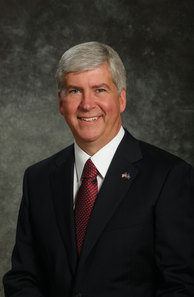Rick Snyder 2014: Michigan Governors Win Reelection at 77% Rate
Gubernatorial incumbents from Michigan are victorious more than three-fourths of the time in general election bids with Republican incumbents at more than 80%

And now, several names are being floated on the Democratic side of the ballot to challenge Snyder in less than two years, including current and former members of Congress and the Michigan Senate minority leader – prospective candidates seemingly buoyed with a concrete issue on which to run.
While Snyder and the GOP legislature’s decision to make Michigan the 24th right-to-work state may have been unpopular in some quarters, it likely cemented the governor’s conservative credentials to stave off any potential primary challenger.
And the electoral history of the Wolverine State has shown that incumbent governors are very difficult to unseat when they make it back onto the general election ballot.
A Smart Politics analysis of Michigan gubernatorial election data finds that incumbent governors have won 34 of 44 general elections since statehood (77.3 percent) including 10 of the last 12 since 1950.
Overall, gubernatorial incumbents have appeared on the subsequent general election ballot in 44 of 78 cycles since 1835.
Republican incumbents, like Snyder, have won 23 of 28 such elections, or 82 percent of the time.
The last Republican governor to lose at the ballot box was Kim Sigler in 1948.
After trouncing his Democrat opponent (and former governor) Murray Von Wagoner in 1946 by 21.6 points, Sigler was defeated by 7.8 points two years later by Soapy Williams.
Williams would go on to win reelection in 1950, 1952, 1954, 1956, and 1958.
Michigan governors now serve four-year terms like 47 other states across the country, and are limited to two such terms.
The only gubernatorial incumbents from Michigan to lose since the 1940s are Democrats John Swainson (who followed Williams) in 1962 and James Blanchard seeking a third term in 1990.
Victorious incumbents during this span are Republicans George Romney (1964), William Milliken (1970, 1974, 1978), and John Engler (1994, 1998) and Democrats Jim Blanchard (1986) and Jennifer Granholm (2006).
This incumbency advantage is not a recent development in Michigan gubernatorial electoral history.
For nearly a 100-year period from statehood through the 1920s, incumbents were elected in 20 of 22 cycles in which they appeared on the general election ballot.
The only incumbents to lose during this span were Republican David Jerome in 1882 to Fusion candidate Josiah Begole, and two years later when Begole lost to Republican Russell Alger.
The one brief period in state history in which gubernatorial incumbents stumbled at the ballot box was from 1932 through 1948 when six of seven were defeated:
· 1932: Republican Wilbur Brucker lost by 11.8 points to Democrat William Comstock.
· 1936: Republican Frank Fitzgerald lost by 2.8 points to Democrat Frank Murphy.
· 1938: Murphy lost to Fitzerland in a rematch by 5.8 points.
· 1940: Republican Governor (via succession) Luren Dickenson lost by 6.5 points to Murray Von Wagoner.
· 1942: Van Wagoner lost by 5.9 points to Republican Harry Kelly. Kelly was the only incumbent to win during this span – by 9.9 points over Democrat Edward Fry.
· 1948: Republican Kim Sigler lost by 7.8 points to Democrat Soapy Williams.
But even if Democrats are able to leverage the right-to-work issue in Michigan, they should not expect a cakewalk in November 2014.
The average margin of loss for the 10 gubernatorial incumbents who did lose their seat was just 4.7 points, with five of these contests decided by less than three points and all but one by single digits.
Follow Smart Politics on Twitter.

1. The string of losses (’32-’48) is rather unsurprising, given that the period cited was a most turbulent era (with massive sit-down strikes and all that), and state governors tend to become the focal point of voter discontent (In 1990 Blanchard and five others lost the general election, even as only one US senator was ousted on the same day).
2. The existence of Taft-Hartley (“right-to-work” or “right-to-freeload”) law recently has been unpopular only in the public sector; private industry has become less and less unionised, paralleling the decline of heavy manufacturing in MI, IN, and elsewhere.